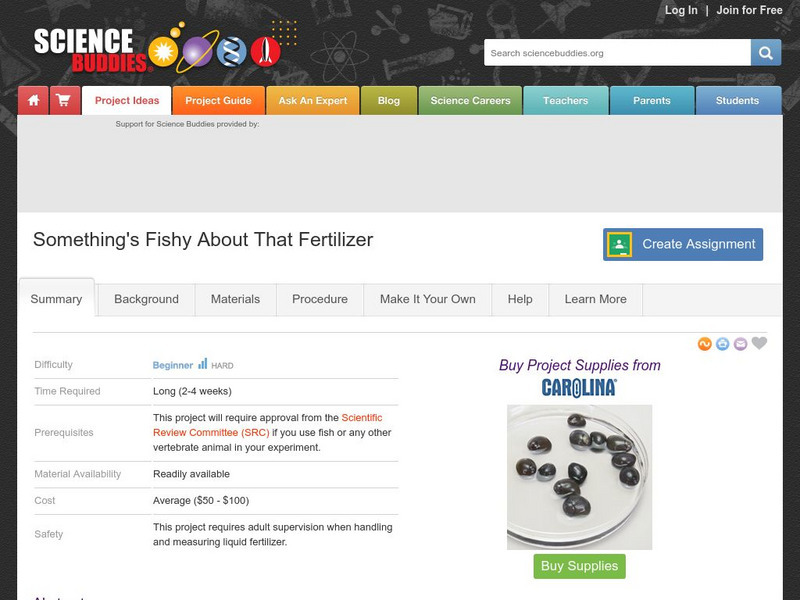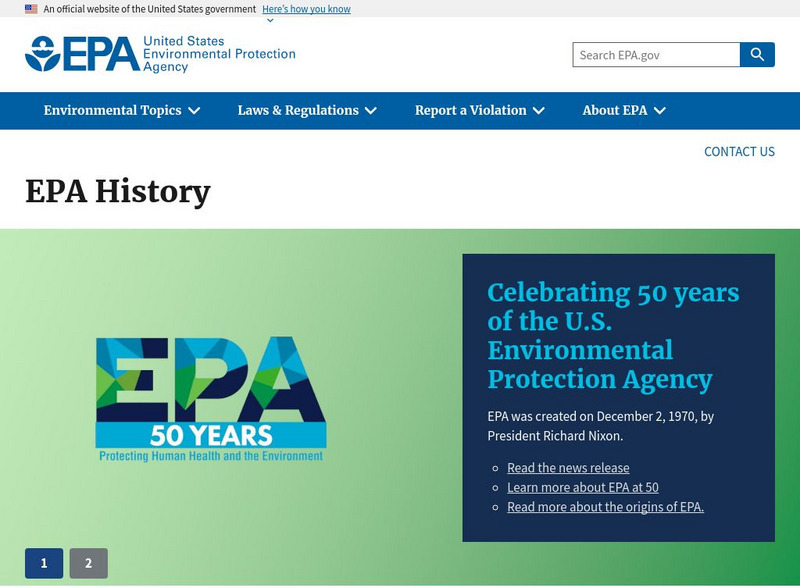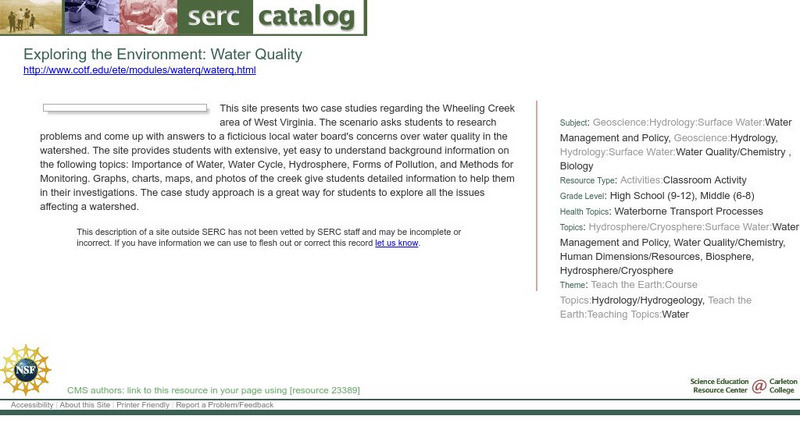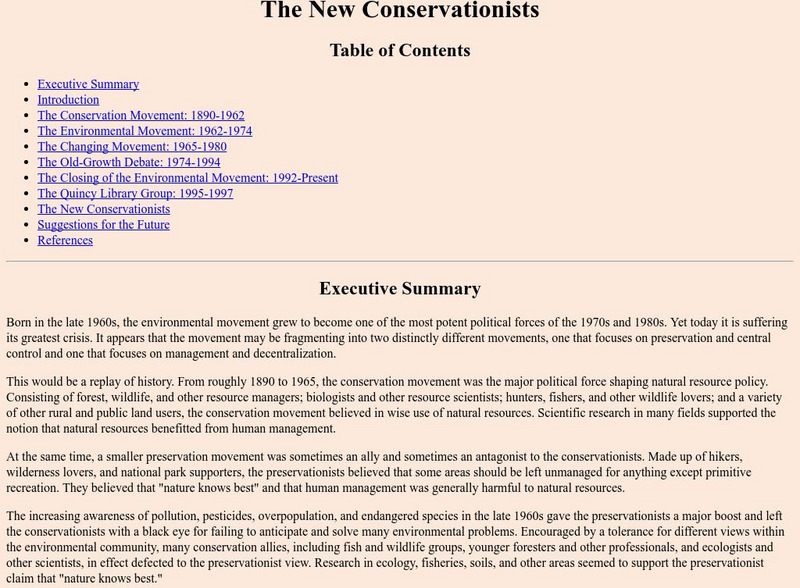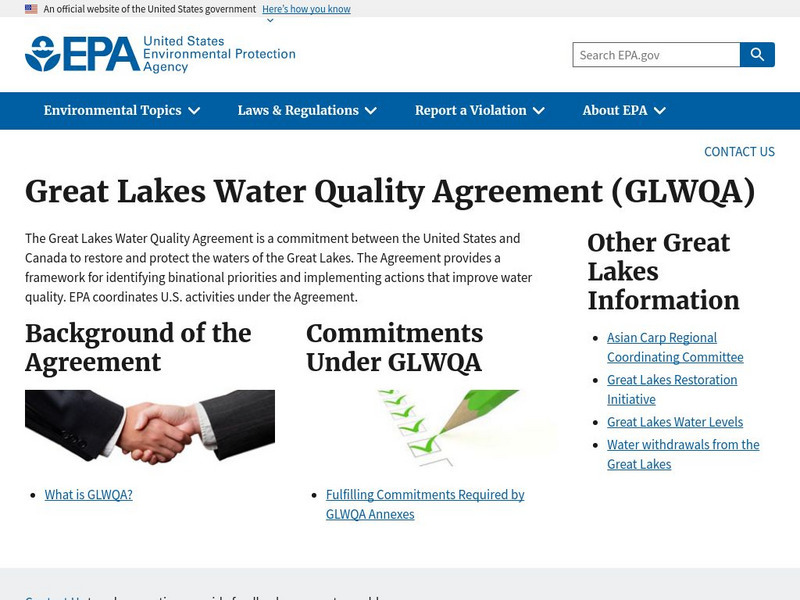Science Buddies
Science Buddies: Something's Fishy About That Fertilizer
Did you know that when you use fertilizer in your garden, it can eventually reach a lake, stream, or pond? There are many different chemicals present in fertilizers. Learn how they affect the aquatic organisms in the ecosystem within...
Science Buddies
Science Buddies: Heavy Metals and Aquatic Environments
You might know that lead can be toxic, and that you can get lead poisoning from eating or inhaling old paint dust. Lead is called a heavy metal, and there are other sources of heavy metals that can be toxic, too. Silver, copper, mercury,...
US Environmental Protection Agency
Epa: History of the Epa
A complete history of the U.S. Environmental Protection Agency including a timeline, publications, biographies of administrators, origins of the Agency, and photographs.
Science Education Resource Center at Carleton College
Serc: Investigating Ponds and Streams: How Clean Is Our Water?
In this field lab, students investigate the differences in three city ponds. Students will compare pond life, temperature, pH, Ammonia, dissolved oxygen, and Nitrate. The student use the pond sheets (Flinn Scientific Catalog 2007) to...
Science Education Resource Center at Carleton College
Serc: Exploring the Environment: Water Quality
A project based scenario where students research problems and come up with answers to a local water board's concerns over water quality in the watershed. Background information is accessible for the following topics: importance of water,...
Environmental Chemistry
Evironmental chemistry.com: Grown Ups Don't Do Blue Goo
Tells the story of Love Canal, NY and the contamination that was happening there and what has been done about it recently.
Encyclopedia of Earth
Encyclopedia of Earth: Noise Pollution
Explains what noise pollution is, sources, the effects of noise propagation, the impact on health and on human and animal behaviors, strategies for reducing the effects of noise, and standards in place for regulating noise pollution....
Encyclopedia of Earth
Encyclopedia of Earth: Health Effects of Light Pollution
Article discusses the impact of light pollution on the health of human beings as well as on plants and wildlife. (Updated July 18, 2012)
Other
Air Info Now: Co Buildup in the City
Is an inversion layer trapping the pollution in CO City? Control the growth of CO city and the time of day, investigate air mixing and air temperature to see how pollution can get trapped.
Other
Thoreau Institute: The History of Environmentalism
This essay is a thorough investigation of the various political and philosophical changes which have occurred throughout the environmental movement. Examines the current situation and includes references. Excellent article.
US Environmental Protection Agency
Epa: What Is the Great Lakes Water Quality Agreement?
This site details the signing and revision of the Great Lakes Water Quality Agreement by the United States and Canada. Includes a copy of the revised agreement of 1978.
Other
Llnl:this Hybrid Vehicle Uses Hydrogen
Describes hybrid vehicles and their contributions to increasing the efficiency of automobiles. Explains the challenges faced by the design team and shows a nice schematic. From a 1995 article.
US Geological Survey
Usgs: National Water Quality Assessment Program
Use this website to find out about water quality issues anywhere in the U.S.A. where water studies have been conducted by the U.S. Geological Survey.
US Geological Survey
U.s. Geological Survey: Water Science for Schools: Acid Rain
An introduction, aimed at upper elementary- and middle-school learners, to acid rain. [Click back to home to access the site in Spanish.]
US Geological Survey
Usgs: Water Science for Schools Effects of Urbanization
This U.S. Geological Survey website offers a short article then lists topics that are linked to brief articles that describe that particular topic's effect on water quality in urban areas. Click Home to access the site in Spanish.
United Nations
United Nations Cyberschoolbus: Cities of Today, Cities of Tomorrow
The six teaching units of this site provide an overview of urbanization, its history, its potential, its problems. The site has lots of activities, and a game.
Nature Conservancy
The Nature Conservancy: Gardens Activity Guide: Water
In this guide helps students understand their garden as a model watershed through the collection and analysis of rainwater filtration data.[4.06]
DOGO Media
Dogo News: How Mealworms May Reduce Our Pollution Problem
Scientists have recently found that mealworms may be able to break down and degrade styrofoam, a form of plastic previously thought not to be biodegradable. Read how this discovery may affect pollution.
Georgia Department of Education
Ga Virtual Learning: Ap Environmental Science: Toxicology and Human Health
Students investigate hazards to human health that are found where we live, work, and play, and begin to understand the risk analysis and system of evaluation that was developed to protect us from potential environmental dangers.
Georgia Department of Education
Ga Virtual Learning: Human Environmental Impacts
In this module, we will explore the concept of pollution and discuss how human use of resources relates. We will discuss the evidence for and against human-caused climate change. Students will compare and contrast pollution cleanup with...
Other
Save Our Seas Organization: Home Page
Home page of the Save Our Seas Organization which seeks to protect all the oceans of the world.
US Environmental Protection Agency
Epa: Acid Rain
What are the causes and effects of acid rain in our environment? To learn more about this serious environmental issue check out this website. Contains a page with several acid rain activities for students.
University of Wisconsin
The Why Files: Oceans' True Boundaries and "Garbage Patches"
A deep look at ocean circulation returns a surprise: Currents transport water - and non-degradable, floating plastic - between the ocean basins. Thus, some of the plastic in the South Atlantic "garbage gyre" was actually thrown away in...
US Environmental Protection Agency
Epa: Why Are Wetlands Important?
Find out why wetlands provide natural water quality, flood protection, erosion control, recreation and aesthetic appreciation, and natural products.


